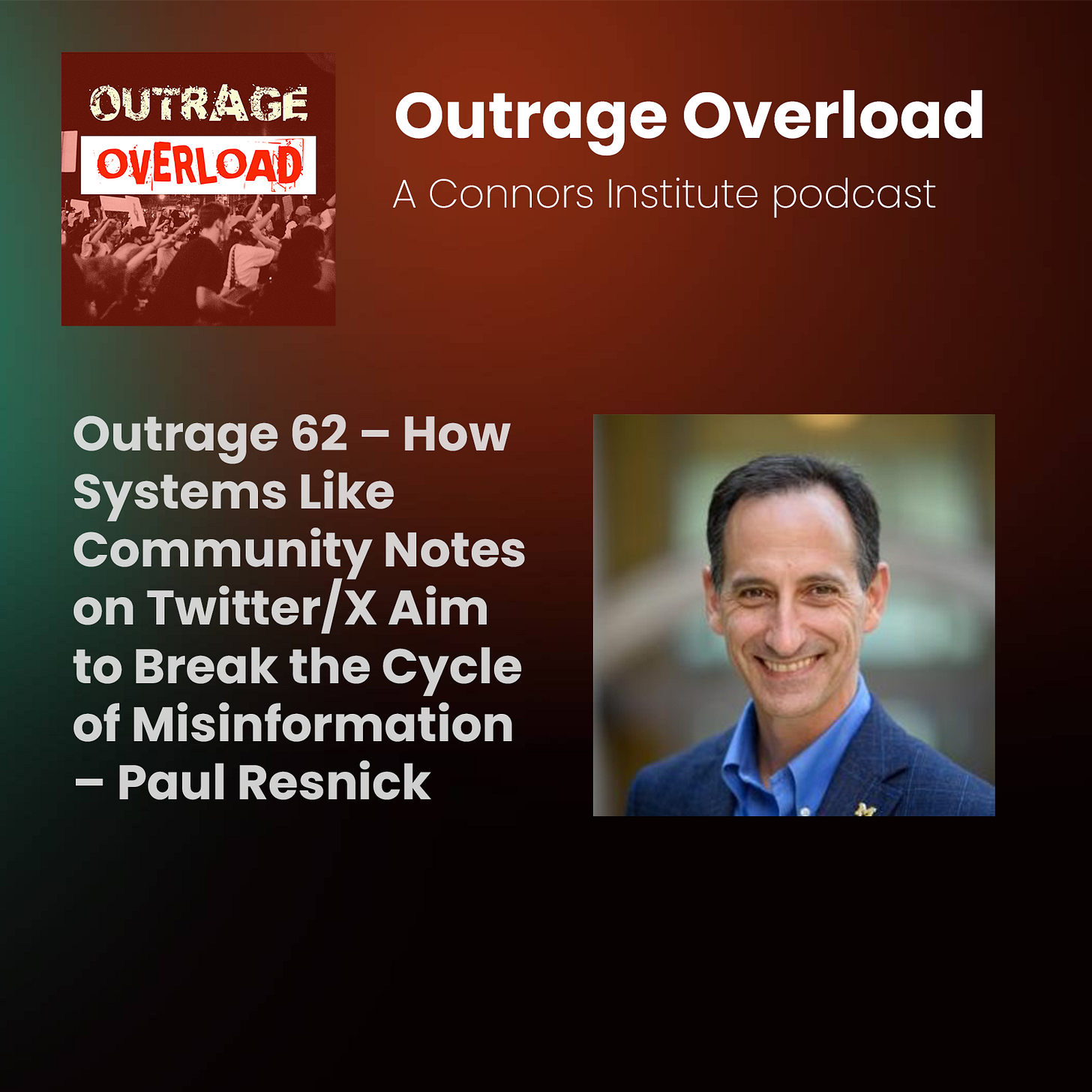Algorithms, Outrage, and the Echo Chamber Effect — Can Tech Help Us Reconnect?
Are Algorithms Fueling Outrage—Or Can They Help Fix It? Plus live Q&A event and new 'This Week in Outrage' Episode
We’ve got a fascinating new episode out today that explores the mechanics of how social media shapes our beliefs—and our divisions.
Our guest is Paul Resnick, a pioneer in recommender systems and professor at the University of Michigan, whose work explores how digital platforms influence what we see and how we engage with each other. You may know him from his work on GroupLens or the book Building Successful Online Communities.
In our conversation, we tackle some big questions:
Are echo chambers and filter bubbles really what’s driving polarization?
How do algorithms actually decide what we see—and is it helping or hurting democracy?
Can tools like Community Notes on X (formerly Twitter) help cut through the noise and reduce online outrage?
Professor Resnick brings a nuanced perspective that blends computer science, psychology, and political science. This episode is part of my effort to bring more tech-focused content into the show—especially the kind that touches on our shared civic life.
As always, thank you for listening and sharing. If you find this episode thought-provoking, I’d love it if you shared it with a friend or two who’s also trying to make sense of our noisy digital world.
🧨 Live Panel: Resisting Authoritarianism—Without Losing Ourselves
April 22 | National Week of Conversation
It’s no longer hypothetical: the second Trump administration is here, and it’s already taking bold steps that many constitutional scholars—including Republican-appointed judges and former DOJ officials—are calling deeply concerning.
We’re seeing:
Expansions of executive power
Defiance of Supreme Court rulings
Obstruction of Congress
Systematic dismantling of civil service protections
Targeting of political opponents, attorneys, and career professionals
A push to politicize the federal workforce and the justice system
Actions that many experts say would’ve been impeachable under any prior president
These aren’t just partisan talking points. They’re red flags for anyone who cares about democracy, rule of law, or a functioning constitutional system.
So here’s the question we’re asking:
How do we respond—without losing sight of the values we’re trying to defend?
I’m hosting a special Outrage Overload live panel Q&A on April 22 as part of National Week of Conversation. We’re bringing together some of the sharpest, most thoughtful voices from across the spectrum—including past podcast guests—to wrestle with the real tension between resistance and bridge-building.
We’ll be asking:
Can we fight back without dehumanizing?
What does strategic outrage look like in a moment like this?
Can persuasion and protest coexist?
How do we stay grounded when it feels like the rules no longer apply?
This isn’t a “both sides” conversation. It’s a how-do-we-stay-effective-and-human-in-a-polarizing-crisis conversation.
I hope you’ll join us.
📅 Tuesday, April 22
🕕 6pm PT / 9pm ET
📍 Streaming live on YouTube → Set a Reminder »
New This Week in Outrage Episode!
It’s everything the Outrage Overload podcast is not. It’s not edited. It’s not scripted. It’s lightly researched. It’s David and Lisa talking about this week in outrage, what was in the news, in the memes, and maybe finding some backstory with a humorous (at least to us) twist.
“Nobody Fucking Cares” — Lisa Lets Loose - 4/13/2025
This week, Lisa and David talk about tariff chaos (again), stock manipulation; April 20 Doomsday prophecies that the United States will invoke the Insurrection Act and irrevocably descend into chaos; how to protest safely; Viktor Orban as the model for Trump authoritarian playbook; Carole Cadwalladr “digital coup” T…




Your comments above on the live broadcast that you invited me to participate promise to be lively. Based on the comments above, you have taken an anti-Trump tack with no acknowledgement of contrary points of view, or even that they exist. I'll be ready to respond with civility and respect, not in defense of Trump Administration actions, but in support of rejecting partisan or ideological mindsets to create genuine dialogues that allow us to learn, and hopefully build trust and respect. A fundamental tenet of civility is acknowledging that every issue has at least two sides and is worth exploring with humility and curiosity. That is the point of your session.